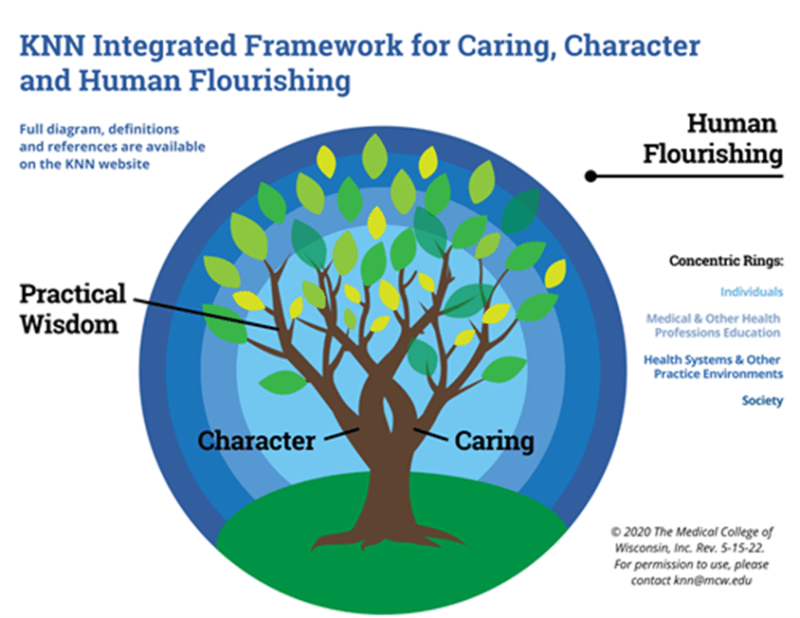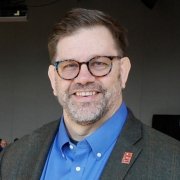A Novel Flourishing Framework for Addressing Challenges in Health Professions Education
MedEdPearls December 2022: What does flourishing have to do with empowering learners, developing faculty leaders, and transforming learning environments in medical and health professions education?
What does flourishing have to do with empowering learners, developing faculty leaders, and transforming learning environments? At the annual Generalists in Medical Education conference, John Luk from the Dell Medical School at UT-Austin and Kimara Ellefson from the University of Wisconsin shared a novel framework for flourishing developed by the Kern National Network for Caring and Character (KNN). After describing the framework, they prompted participants to apply it to common challenges in health professions education like striving for equity in admissions or overcoming bias in assessment.
KNN defines flourishing as “a wholeness –of being and doing, realizing one’s potential and helping others to do the same.” Character and caring are at the heart of the framework. Character is defined as a “constellation of characteristics –moral, civic, intellectual and performance— that are formed over time and manifest in dispositions and practices.” Caring is a blend of “practices, dispositions and motivations all aimed at ensuring that individuals and populations grow, develop and flourish as best they can.” Character and caring inform practical wisdom which is “discerning the right way to do the right thing in a particular circumstance, with a particular person, at a particular time.”
KNN has developed an infographic with a tree placed prominently in the center. The elements of the infographic include:
Blue concentric rings to show the levels of the ecosystem across which the elements of character, caring and practical wisdom operate to promote flourishing from the individual to society as a whole. The tree as a whole represents how caring professions contribute to human flourishing through caring and character. The tree trunk depicts interrelationship of caring and character as the structure that supports and leads to human flourishing. The two main branches represent the different but related roles of caring and character; practical wisdom is represented by the offshoots from the main branches. The different leaf colors reflect that human flourishing can ebb and flow.

The KNN integrated framework illustrates how the key constructs of the KNN’s work—caring, character, practical wisdom and human flourishing—are dynamically related and synergistic. KNN is focused on advancing understanding of how the components interact and can be applied in their three initiatives 1) supporting the development of clinical learning environments that prepare learners to meet new demands to care for patients and populations 2) preparing medical students for career of learning centered on excellence and providing patient-centered care and flourishing as healthy professionals, and 3) developing faculty who focus on caring and character to facilitate creative thinking and connecting with students in collaborative, interactive ways.
What challenges are you facing that require flourishing?
Visual copyright 2020 the Medical College of Wisconsin, Inc. Permission granted for use.
About the MedEdPearls Author

Larry Hurtubise
PhD
- Curriculum and Instruction Consultant, Michael V. Drake Institute for Teaching and Learning, Ohio State University
- Jean Bailey, PhD – Virginia Commonwealth University School of Medicine
- Carrie Bowler, EdD, MS, MLSCM (ASCP) – Mayo Clinic School of Continuous Professional Development
- Kristina Dzara, PhD, MMSc (Educators ’16; Assessment ’16; HCE 2.0 ’17) – Saint Louis University School of Medicine
- Shanu Gupta, MD, SFHM – University of South Florida Morsani College of Medicine and Tampa General Hospital
- Jennifer Hillyer, PhD – Northeast Ohio Medical University
- Larry Hurtubise, PhD, MA (HCE 2.0 '16) – The Ohio State University
- Anna Lama, EdD, MA – West Virginia University School of Medicine
- Machelle Linsenmeyer, EdD, NAOME (Assessment ’07) – West Virginia School of Osteopathic Medicine
- Skye McKennon, PharmD, BCPS, ACSM-GEI – Washington State University Elson S. Floyd College of Medicine
- Rachel Moquin, EdD, MA – Washington University School of Medicine
- Stacey Pylman, PhD – Michigan State University College of Human Medicine
- Leah Sheridan, PhD – Northeast Ohio Medical University
- Lonika Sood, MBBS, MHPE – Washington State University Elson S. Floyd College of Medicine
- Mark Terrell, EdD – Lake Erie College of Osteopathic Medicine
- Stacey Wahl, PhD – Virginia Commonwealth University School of Medicine
Harvard Macy Institute
Harvard Macy Institute
The Harvard Macy Institute educates, connects, and serves health care leaders around the globe by providing advanced faculty development programs, thought leadership, and impactful networking opportunities.
6 Programs

